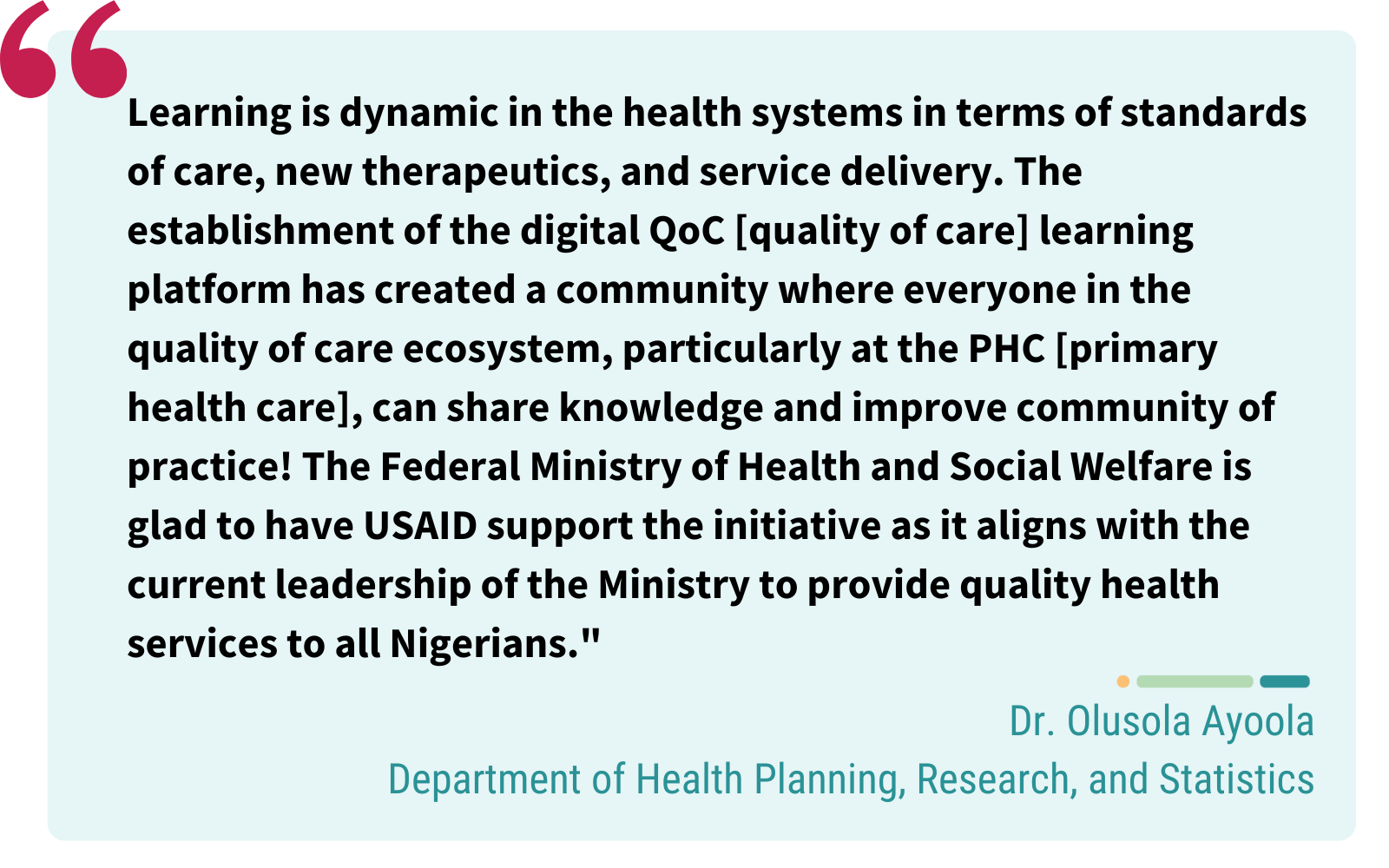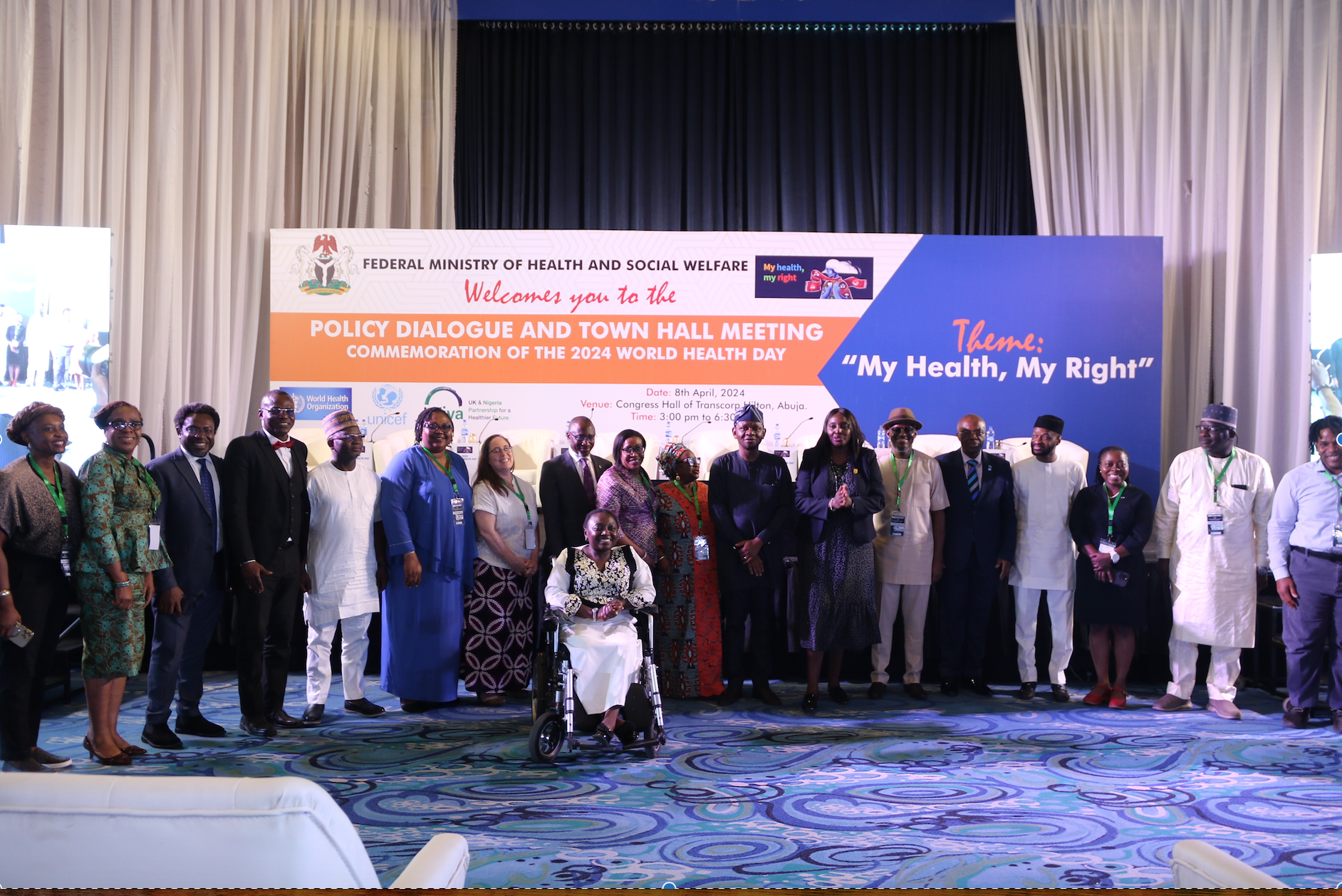7 Tips for Building a Learning Platform: Insights from MOMENTUM’s Quality of Care Experience in Nigeria
Published on December 10, 2024
By Devan Deignan and Reshma Naik, MOMENTUM Knowledge Accelerator, and Nnenna Ezeokafor, MOMENTUM Country and Global Leadership
This post was originally published on usaidlearninglab.org. You can find the original piece here.
This blog was developed based on interviews with Maureen Tshabalala and Stephen Luna-Muse and with contributions from Chibugo Okoli, Elizabeth Eastman, Kendra Njoku, and Oris Ikiddeh (all from MOMENTUM Country and Global Leadership). It is the fifth in a series by MOMENTUM focused on knowledge management for global health programs. Explore the other blogs here.
Contact MOMENTUMKM@prb.org with any questions about this series.
When Nigeria joined the World Health Organization multi-country network for improving quality of care for maternal, newborn, and child health in 2017, stakeholders recognized the country’s need for more strategies and guidance for advancing quality of care in maternal, newborn and child health. In the years that followed, the country’s Federal Ministry of Health and Social Welfare (FMOH) established a national Maternal, Newborn, and Child Health Quality Improvement Technical Working Group, which created Nigeria’s first-ever National Quality Strategy for Reproductive, Maternal, Newborn and Child Health in 2018. The ensuing national operational plan, released in 2021, and complemented by subsequent state-level operational plans, highlighted the importance of learning and knowledge-sharing related to quality of care. This emphasis mirrored one of the four strategic leadership, action, learning, and accountability objectives of the QoC Network: to facilitate learning and share knowledge and generate learning on quality of care. The operational plan called for the development and reinforcement of learning systems (online, in-person) to improve access to critical resources and data and facilitate shared learning.
Responding to this call, MOMENTUM Country and Global Leadership, one of six USAID-supported projects in the global MOMENTUM suite, set out to support the FMOH to develop a quality of care learning platform that would benefit a wide range of stakeholders, including national and state-level government officials, frontline health workers, medical students, and program implementers. Nigeria’s National Quality of Care Learning Platform launched in April 2024 and is now fully operational, but its smooth interface belies the hard work and sometimes winding path required to create it. This blog offers some key insights the team gained along the way, in hopes they may help others building a similar platform in the future.

1. Ask people how they want to use the platform—and design it that way.
The MOMENTUM team’s very first step was to conduct a needs assessment with intended users of the platform—stakeholders that included health care workers, patients, and government officials—to learn about the features and functionalities they wanted. Some of the answers were unexpected. For example, health care workers said they wanted a space where they could get direct feedback from their patients. In response, the team developed a feature for patients to anonymously share their health care experiences. Providers—especially those on the frontline—also wanted ways to access essential information and training resources on the go, which led to the development of a mobile-friendly website that offered training certificate programs. In addition to making sure the platform was useful, the needs assessment helped cultivate a sense of ownership among future users, increasing their investment in the platform’s success.
2. Use trusted resources—and keep them updated.
To try out—and keep coming back to—a learning platform, stakeholders must feel confident that it’s a legitimate source for accurate, up-to-date, and reliable information. The FMOH and MOMENTUM team curated resources from well-recognized and trusted institutions, from national institutions (like the FMOH) to international bodies (like the World Health Organization). Responding to user feedback, the team also incorporated resources specifically relevant to the Nigerian context. Coordination with FMOH staff and other government officials ensured that the most current national and state policy guidelines were included, with staff members designated to refresh content as policies were updated or new policies were developed. And by providing direct links to the original sources online—rather than relying on static PDFs—the team ensured that users always had access to the latest information. These comprehensive efforts not only encouraged use of the available resources but also motivated Nigerian state officials and other users to actively contribute their own quality of care data, enhancing the platform’s value and impact.
3. Lay the groundwork for sustainability from the start.
While we may wish for projects to continue indefinitely, the reality is most have an end date. How can you ensure your work lives on? Given the MOMENTUM team’s established partnership with the FMOH, they saw government ownership as the best chance for their platform’s survival. By working closely with FMOH counterparts, the team was able to assemble and energize a group within the government that was invested in the success of the platform. The FMOH contacts included updates on the learning platform as part of meeting agendas, keeping stakeholders informed and soliciting real-time feedback. The development process was very collaborative, with the FMOH leading key decisions throughout the process, from selecting the website vendor to managing content. By the time the platform launched, the FMOH fully owned it and was strongly invested in its long-term success.

4. Expect delays and plan extra days.
While keeping things moving matters, it’s also helpful to be flexible because official processes and protocols can be lengthy and complex. Initially, the MOMENTUM team was confident they could work with the FMOH to launch the platform within nine months, and at two months in, the platform was built and ready for content. The team had envisioned launching the platform in two phases, with the first phase addressing the country’s most urgent needs. However, the ministry’s comprehensive processes meant that getting all the necessary content for the platform—data, photos, resources—would take longer than anticipated. The extended timeline turned out to be fortuitous, giving the FMOH and the MOMENTUM team more time to build consensus among stakeholders and learn more about their users. In hindsight, the team realized had they launched a more rudimentary version of the platform without a full range of features, they may have struggled to keep users engaged. Although the project took 15 months, this approach was ultimately the right one. When building a platform, it’s important to expect the unexpected and adjust timelines accordingly. Not only will you be better prepared—you’ll also end up with a more inclusive and representative final product.
5. Work with local and engaged vendors.
Choosing the right vendor to build the platform you’ve meticulously designed is no easy task. The MOMENTUM team recommends selecting a local vendor that is well-versed in the context where you are working and is genuinely committed to your platform’s success. With guidance from the FMOH, the MOMENTUM team intentionally chose a local company that was committed to supporting the platform after its public launch, providing maintenance and updates and training FMOH staff to be long-term platform managers. This boosted the team’s confidence in the platform’s longevity.
6. Market and promote your platform.
If you build it, they won’t (necessarily) come! It’s important to strategically market your platform, not only to raise awareness of its existence but to draw people in to use it repeatedly. One way the team promoted the platform was by hosting a webinar about its features and benefits.
The FMOH also provided several ideas for generating buzz and visibility. One key recommendation was to integrate the platform directly into the FMOH website, a popular resource with a similar user profile. The FMOH staff offered to lead conversations with the Minister of Health to see the integration through and helped facilitate conversations between the MOMENTUM team and the government’s platform managers.
The team also demonstrated how to use the platform at various meetings and technical working groups, including presentations to key FMOH leaders. Per a suggestion from government partners, the platform was launched at an FMOH event for World Health Day on April 8, 2024. Permanent Secretary Mrs. Daju Kachollom S. Mni inaugurated the platform in front of over 200 attendees from various ministries, agencies, donor organizations, civil society organizations, and other stakeholder groups.


7. Consider ongoing costs after launch.
When budgeting for a learning platform, it is crucial to not only account for design, development, and launch, but also future maintenance and updates. Involving the people who will be responsible for future upkeep in these budget decisions is critical. The MOMENTUM team suggests incorporating a one-year, post-launch plan into the contract with the platform developer to give you the opportunity to assess how the platform is used in practice, define problem areas, and identify new user needs—and to address these as appropriate. The team did future planning with the FMOH, discussing long-term financing for IT staff and project support to sustain the platform. The FMOH is currently planning to incorporate resources for maintenance and updates into their future budgets. Factoring sustainability considerations into planning and budgeting can help optimize upfront investments.
The next time you’re tasked with developing a learning platform, use these lessons from the development of a QoC learning platform in Nigeria to ensure a smooth and efficient process!

